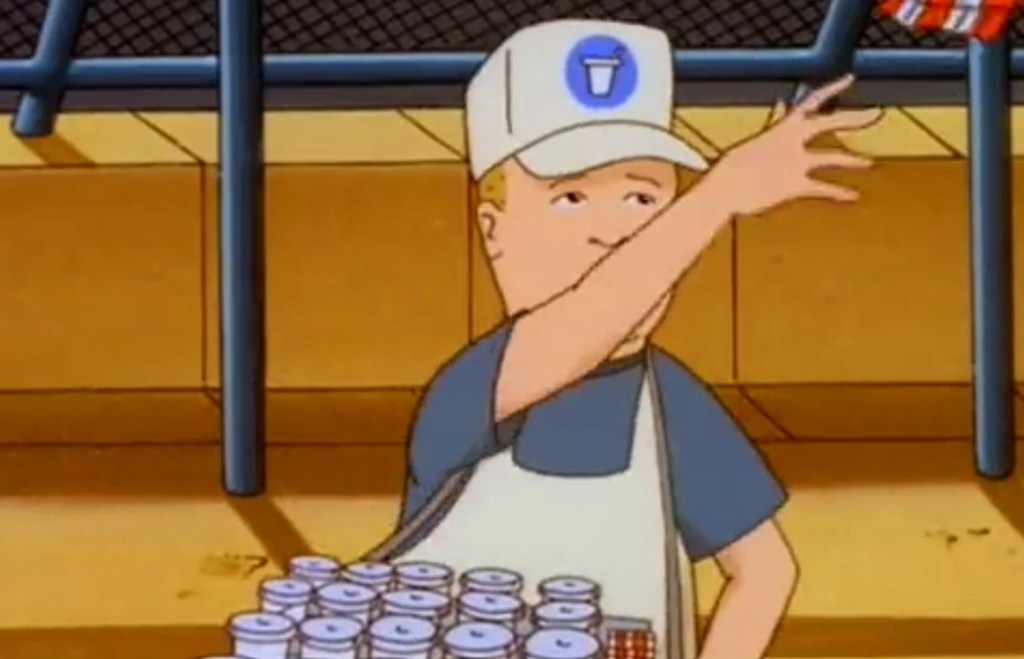With the King of the Hill revival leaping forward nearly a decade for the characters, we’ll get to see Bobby Hill beyond his adolescence. So, with that in mind, now’s the perfect time to revisit some of the best episodes centered on the lovably awkward, endlessly curious son of Hank and Peggy Hill. Bobby is one of the most memorable characters in animated TV, embodying the mix of innocence, ambition, and eccentricity that made the show stand out.
Videos by ComicBook.com
Below, we’ve compiled the must-watch episodes that will give you the best picture of Bobby Hill before you check out the highly anticipated revival.
10) “Life in the Fast Lane: Bobby’s Saga” (Season 2, Episode 21)

In “Life in the Fast Lane: Bobby’s Saga,” Hank gets Bobby a job at the racetrack in an attempt to teach his son the meaning of hard work. But little does he know, Bobby’s boss, Jimmy Wichard, is completely unstable. From the start, Bobby faces a grueling environment under Wichard. His boss’ cruel and erratic behavior forces Bobby to confront the harsh realities of work and responsibility far earlier than he anticipated.
Miserable, he goes home to talk to Hank, who urges his son to push on through. This moment is a turning point for Bobby, who decides not to run away from the challenge but to face it head-on. But when Bobby’s life is endangered by Wichard’s demands, Hank intervenes.
In the aftermath, Bobby refuses Hank’s offer to pay him for his work, saying he didn’t do it for money but because he wanted to prove something — to himself and to those around him. This quiet but powerful declaration marks a major step in Bobby’s journey toward self-confidence and independence.
9) “And They Call It Bobby Love” (Season 3, Episode 2)

“And They Call It Bobby Love” perfectly captures the essence of teenage angst, filtered through Bobby’s distinctive charm and innocence. It is Bobby’s first foray into romance, which becomes a frequent source of both comedy and genuine emotion throughout King of the Hill. This episode captures the awkwardness and innocence of first crushes as Bobby tries to win over a girl, navigating the confusion and earnestness that come with young love.
The charm here lies in how the episode portrays Bobby’s sincerity, which contrasts beautifully with the often sarcastic or cynical world around him. Bobby’s unique perspective on relationships and his open-hearted attempts to express affection make this episode resonate deeply. It’s a reminder of why Bobby remains such a beloved character.
Most importantly, the show treats Bobby’s feelings with respect rather than ridicule. That steak-eating scene isn’t just comedic — it’s a surprisingly empowering moment where Bobby reclaims his dignity on his own terms.
8) “What Makes Bobby Run?” (Season 5, Episode 7)

Ever the entertainer, this episode sees Bobby losing out as class clown and taking on the role of school mascot instead.
However, Bobby quickly learns that being the school mascot comes with a painful tradition called the “McMaynerbury’s Whuppin’s,” where the Arlen mascot faces physical punishment from the rival band if Arlen is winning. When Arlen pulls ahead at his first game, panic sets in, and Bobby bolts from the stadium in fear. When he returns to school Bobby is ridiculed.
However, he goes on to redeem himself both as the mascot — Landry Longhorn — and as a brave student of Arlen’s Tom Landry Middle School. He sneaks into a rival school, steals their armadillo mascot, and parades it at the next game.
Throughout “What Makes Bobby Run?” Bobby’s arc is about more than just winning or being popular. It’s a journey of resilience and self-discovery. From disappointment to fear, from embarrassment to courage, Bobby learns that true strength comes from facing challenges head-on and refusing to let setbacks define him.
7) “An Officer and a Gentle Boy” (Season 7, Episode 15)

“An Officer and a Gentle Boy” puts Bobby to the test when he’s sent to military school for disrespecting Hank.
When he arrives at Fort Berk, however, Bobby fits in well, thriving in the structured environment without having to abandon his personality. He takes to the routine with ease, impressing instructors and students alike. In an art class, he crafts a decorative bowl — playful, quirky, and wholly Bobby.
But Bobby’s grandfather, Cotton, is far from impressed. To him, the modern academy is soft, a betrayal of the institution he endured. Cotton seizes control of the school and pushes Bobby to extremes. Through it all, Bobby doesn’t fight back or break down — he endures, with the same bizarre composure and stubbornness that drives his comedy and awkward charm.
And that’s the heart of Bobby’s quiet transformation in this episode. He doesn’t succeed through macho aggression or rigid discipline, but through an inner calm and an unshakable sense of self.
6) “The Son Also Roses” (Season 7, Episode 6)

When Bobby gets bored of being the Landry football team’s towel boy, he searches for something more in his wheelhouse, finding inspiration in Minh’s rose garden.
He decides to grow his own roses in secret. When Hank finds out, he’s confused but chooses to support Bobby, helping him prepare for a local rose competition. However, Hank’s competitive instincts get the better of him and ends up causing Bobby’s entry to be disqualified.
Despite the setback, Bobby isn’t discouraged. He’s proud of the work he did, finding satisfaction in the process rather than the prize. For once, Hank sees that his son doesn’t need a trophy to prove his worth. They end the episode planting roses together, with Hank finally embracing Bobby’s individuality. It’s a subtle, sincere story of personal growth for both father and son.
5) “Bobby Goes Nuts” (Season 6, Episode 1)

This is an absolute classic King of the Hill episode. If there’s one moment that has transcended the show to become pure cultural currency, it’s Bobby Hill standing his ground and shouting: “That’s my purse! I don’t know you!”
The episode kicks off when Bobby is bullied at the mall and Hank’s half-hearted advice to “just walk it off” proves useless. In response, Bobby enrolls in a women’s self-defense class. There, he adopts a groin-kicking tactic. And when he puts his training to use and takes down his bully, it’s a moment of genuine triumph.
What makes this episode endure, beyond the meme and the quote and the perfect comic timing, is that it captures Bobby at his most unexpectedly fearless. It’s a rare, absurd, and triumphant stand, not just against bullies, but against a culture that says there’s only one way to be a strong young man. Bobby refuses to follow that script. And in doing so, he creates his own.
The episode also explores the relationship dynamics within the Hill family, particularly how Hank’s traditional views clash with Bobby’s more unconventional style.
4) “The Boy Can’t Help It” (Season 13, Episode 19)

Another insight into Bobby’s love life comes in “The Boy Can’t Help It.” With the homecoming dance looming, Bobby faces rejection while searching for a date. He’s bummed out until three older, college-prep girls suddenly take interest, and he naively believes they’re all going to the dance together.
Hank grows increasingly concerned, sensing Bobby’s being manipulated, but Bobby is too caught up in the attention to notice. When the girls ditch the dance for a party under the bleachers, Bobby tags along, only to discover he was never seen as boyfriend material, just “cute” and “harmless.” Hurt and humiliated, Bobby walks away, just in time for Hank to find him. But when the girls are harassed, Bobby steps in without hesitation.
In the end, Bobby’s heartbreak becomes a quiet coming-of-age moment. He’s rejected, yes, but that doesn’t stop him from doing the right thing and protecting his rejectors. And finally, Hank sees his son’s character in a new light.
3) “A Portrait of the Artist as a Young Clown” (Season 10, Episode 5)

Bobby’s class-clown antics such as disrupting school, church, and even dinner with whoopee cushions get him a chance to head to clown college. Excited, Bobby dives into the course, only to find it nothing like he imagined. The instructor, Professor Twilley, reduces humor to rigid theory and dismisses Bobby’s instincts. Bobby tries to adapt, even studying commedia dell’arte and inventing a character, Tartuffe the Spry Wonder Dog. Twilley is impressed, but Bobby’s joy in comedy begins to fade.
At the school talent show, Bobby debuts his new act — only to be met with confusion and heckling. Bobby pivots mid-performance, grabs a whoopee cushion from Hank, and reclaims his comedic instincts. The crowd erupts in laughter, and Bobby learns his best comedy comes from being unapologetically himself.
2) “Blood and Sauce” (Season 11, Episode 3)

“Blood and Sauce” is a pivotal episode that ties directly into Bobby’s emerging passion for cooking, and him trying to navigate the expectations of his father. Bobby is thriving in the kitchen, happily baking a cake with Peggy. But when Hank walks in, his joy is squashed. Hank’s discomfort with “feminine” hobbies forces Bobby to hand over his pink oven mitts, embarrassed.
Wanting to include Bobby in something more traditionally masculine, Hank volunteers him to help Bill prepare food for the upcoming Dauterive family reunion. Bobby is thrilled. He imagines smoke, spice, and glory. But when he realizes it involves hard labor such as building a pit, and chopping wood, he bails and Bill covers for him.
Feeling guilty, Bobby confesses to his parents and apologizes to Bill. Bobby then offers to help Bill again and sticks with it, even when it gets tough.
1) “To Sirloin With Love” (Season 13, Episode 20)

Topping our list is “To Sirloin With Love.” This episode delivers a deeply satisfying conclusion to the often-complicated relationship between Bobby and Hank.
After years of miscommunication and tension, this episode finally bridges the gap between father and son, showcasing the bond they’ve always sought but struggled to find.
The episode perfectly encapsulates Bobby’s journey towards finding his passion. It delivers a satisfying emotional arc that confirms Bobby’s future direction.
“To Sirloin With Love” is the ultimate Bobby Hill episode because it combines humor, heart, and character growth in a way that fans both old and new can appreciate. This episode remains a cornerstone of Bobby’s arc.









